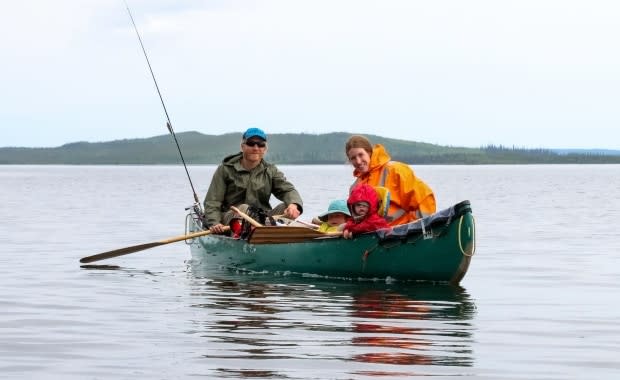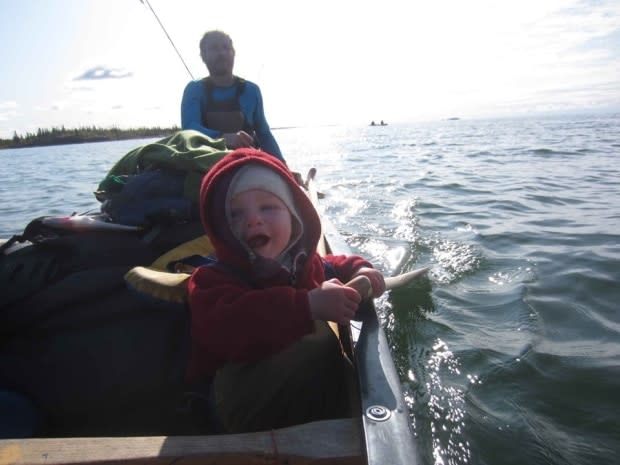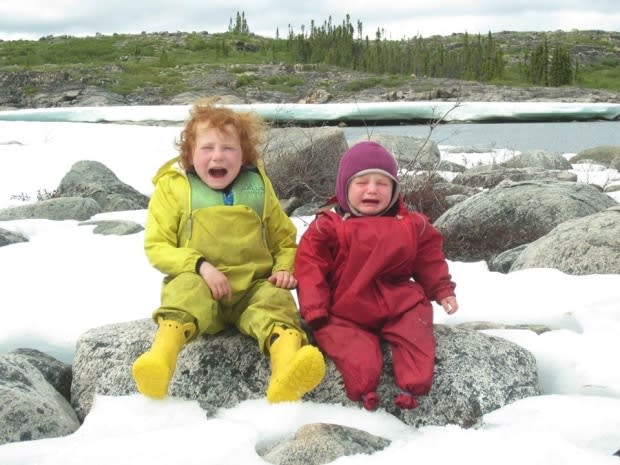Family of 4 makes 1500 km journey through N.W.T. backcountry
A 107-day canoe and backcountry camping expedition across remote waterways of the Northwest Territories could be the trip of a lifetime for anyone, but two Yellowknifers recently did it with a challenging twist.
Leanne Robinson and Dwayne Wohlgemuth's journey began in Fort Fitzgerald, Alberta, and ended in Yellowknife. Together they traversed 17 rivers, lakes and creeks, while making 116 portages to cover 1,500 kilometres of land and water.
But they didn't do it alone. They did it with their one- and four-year-old children in tow.
"We've been doing expeditions — not quite this long — for a number of years," Wohlgemuth said. "When kids came along, we didn't want to stop."
Robinson and Wohlgemuth live off the grid near Yellowknife.
"We're happy outdoors," Wohlgemuth said. "Life is so simple. There's so many reasons why we want to be out there and why we want to take the kids out there."
The couple say they weren't raised to be outdoor types. Neither had extensive canoeing or even camping experience in their own family histories. Robinson said her family had never done any camping with her other than at a campground.

"It really started … when we were together," she said. "Neither of us were doing any long expeditions before we met one another … it just grew exponentially. It started with a couple weeks and then a couple of months and now a couple of months with kids."
"The expeditions just get more fun, and being able to see it through the kids' eyes is really powerful," Robinson said about canoeing, portaging and camping with one- and four-year-old children.
With Emile, 4, it was easy to see how much he enjoyed the trip in his interactions with nature, he said, but with Aleksi, 1, it was more a matter of believing the experiences might make a lasting impression in his young mind.
Robinson put it this way: "A quarter of [Aleksi's] life was spent on that canoe trip. We hope the things he was learning and observing were all related to being out on the land."

It would be a monumental understatement to say travelling for weeks in the backcountry with children has its challenges, but for Robinson and Wohlgemuth, some of those challenges led to innovation, and a deepened respect for traditional ways.
Keeping dry diapers on hand was one of the biggest challenges. Robinson said they couldn't get diapers properly dried out, and they at times had to change Aleksi in the rain.

"It had been cold and rainy and Aleksi had a terrible diaper rash," Robinson said.
"Are we doing the right thing?" Robinson said she asked herself, but answered in the affirmative.
"The diaper rash was getting out of hand, but he was still — somehow — he was still loving it."
They started to collect moss to dry out and line Aleksi's diapers with. That did the trick.
"We were trying to make things up on the fly," Robinson said. "That's what we were missing out there … the knowledge that gets passed down from generation to generation.
"It would have been nice to have an elder along with us to share those very basic things. [Such as] how do you breastfeed in the bugs?"

For the adults, being deep in the bush in remote, rugged and unforgiving territory — detached from society — was an opportunity to get in touch with the deepest parts of themselves.
"All of a sudden you have time to think and to reflect on what life is about," Robinson said.
"That's why I keep going on these things. That moment of clarity that you get when you're out there — you understand what's important and what's not important … because you have time to think and you can actually figure that out."
The children may not have been ready for philosophical reverie, but that doesn't mean they weren't flexing cognitive muscles in important ways.
Emile occupied himself with helping out with daily chores, gathering berries, and running like a natural over wild and rough terrain his father needed hands and feet to safely navigate.
He also played a big part in devouring the 227 fish the family consumed on the trip — an estimated 445 kilograms.

"This guy ate mountains of fish," Wohlgemuth said of Emile. But it didn't stop with that.
"Emile would spend hours with a stick and string … pretending he was fishing and catching fish," he said. "A day didn't go by without him [pretending to be] fishing."
That was something no iPad, Nintendo Switch or other expensive electronic gadget could offer.
"The ability to play with nothing … was creative," Robinson said.
"It was in their imagination."

